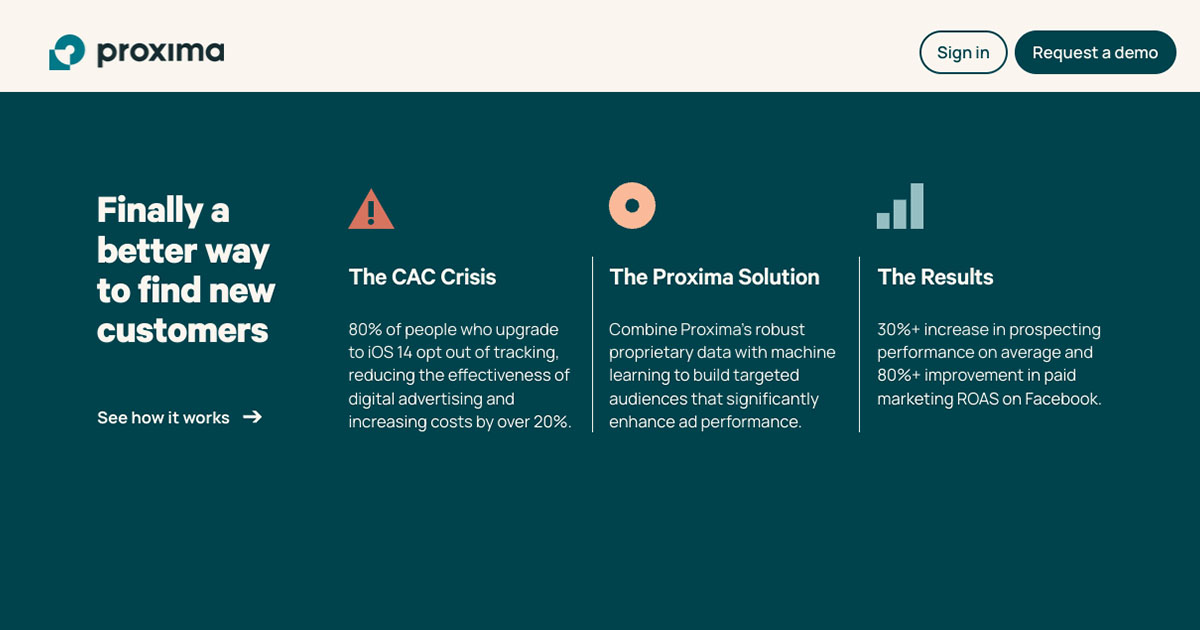Proxima Profile

Last Updated: By TRUiC Team
Proxima is a data science and marketing startup leveraging an anonymized, proprietary database to facilitate the creation of impactful social media ad campaigns.
Interview With Alex Song
Describe your product or service:
“Proxima uniquely leverages a proprietary database of anonymized first-party shopper data to help brands better reach consumers across all major platforms. Proxima uses data science to create algorithms that curate high-performing audiences resulting in more accurate targeting. Based on this, Proxima consistently delivers results which outperform traditional targeted campaigns, saving brands time and money in reaching an engaged audience — ultimately providing a better user experience.”
Describe your company values and mission:
“Proxima is championing the movement to preserve consumer privacy while also optimizing ad performance. The company was founded on the belief that thanks to data science, this does not need to be an either/or.”
How big is your team? Tell us a little about them (I.e. co-founders, freelancers, etc.)
“Team of business professionals and data science engineers.”
How did you come up with and validate your startup idea? Tell us the story!
“Proxima was started by Alex Song, a former Investment banker and serial entrepreneur, who has been incubating and building industry-disrupting business solutions for over 15 years. Having started his career in finance, Alex understood first-hand the competitive advantages that are unlocked from insightful data analysis. He has brought this perspective to each of his ventures and is an expert at helping brands leverage new marketing channels by optimizing customer acquisition.”
How did you come up with your startup's name? Did you have other names you considered?
“Star in a constellation.”
Did you always want to start your own business? What made you want to become an entrepreneur?
“Yes, I've always wanted to be an entrepreneur and have previously launched two companies: Innovation Department and DojoMojo. Proxima was a natural extension.”
Did you encounter any roadblocks when launching your startup? If so, what were they and what did you do to solve them?
“The problem with doing both is that unless you’re very well capitalized and have a large, experienced team, you’ll end up spreading yourself too thin. That’s what happened to us, and we ended up being mediocre across the board. We stopped our investing side and focused solely on building wholly-owned wellness brands. Our first wellness company, WellPath, scaled profitably from $1m ARR to $10mm ARR in just 24 months.”
Feeling inspired? Learn how to launch your company with our guide on how to start a startup.
Who is your target market? How did you establish the right market for your startup?
“Our target market is all digital businesses that are acquiring customers online through social platforms. We have long been building direct-to-consumer businesses ourselves, so we were very familiar with how difficult acquiring customers efficiently can be for an early-stage business. Because we knew these struggles first-hand, we were able to prove our product-market fit before we officially launched.”
What's your marketing strategy?
“Word of mouth has been the biggest driver of new customers for us. We’re fortunate to have first built a partnership network with 15,000 digital businesses signed up starting in 2016, so this has been an amazing source of new customers for us.”
What are the key customer metrics / unit economics / KPIs you pay attention to to monitor the health of your business?
“Our core KPIs are the following:
Churn Rate: Keeps us focused on prioritizing our customers and ensuring we build a product that our customers can’t live without.
Net New ARR: This metric ensures that we maintain growth in our company that investors expect to see from new businesses with remarkable fundamentals.
Net New ARR/Net Burn: This efficiency score keeps us focused on our cash burn, which is particularly important through a recessionary period. Our goal is to stay below 2x.”
What's your favorite startup book and podcast?
“‘Mindset’ by Carol Dweck. It’s not exactly a startup book, but it’s the book I give to every new hire upon signing with the company. I believe a growth mindset is critical to being successful in the challenging startup environment where we’re constantly having to fail forward and learn to make new mistakes.
There are tons of startup podcasts I enjoy, but one that I consistently listen to due to the quality of guests and relevance of content is ‘The Twenty Minute VC’ by Harry Stebbings.”
What is a song or artist that you listen to for motivation?
“I’ve recently been listening to a lot of older hip hop from when I was growing up and have enjoyed the deeper perspective in their storytelling. In particular, Nas, Notorious B.I.G, and 2Pac. The challenges they overcame and the way they channeled their struggles into a relatable and innovative art form, like rap, is highly motivating to me.”
Is there a tool, app, or resource that you swear by to help run your startup?
“We’re really big fans of Monday. We’ve moved a lot of our data operations to serve clients into Monday and the workflows have been highly customizable and easy to get the entire team to adopt.”
What is something that surprised you about entrepreneurship?
“I’ve been surprised by how many people want to be entrepreneurs but aren’t willing to struggle. Being a part of a startup is a long and challenging grind. A lot of aspiring entrepreneurs seem surprised by just how hard things are and how challenging it can be to stay motivated when things are really hard.”
How do you achieve work/life balance as a founder?
“I do my best to carve out recurring non-work time slots for family, friends, and personal ‘Alex Time’ each week that fall outside of my typical work hours. The events are on the calendar and are happening each week to create a rhythm. By blocking off time, the work/life balance becomes purposeful and part of my ‘regimen.’ That being said, it’s not easy, and there’s always room for optimization.”
What is a strategy you use to stay productive and focused?
“I adhere to the Getting Things Done methodology by David Allen. I’ve built both a professional and personal workflow into a kanban board within Notion which I use to prioritize my time each day. I also try to create incentive systems for myself to encourage completing tasks before I get to take breaks, enjoy ‘Me Time’”
Did you have to develop any habits that helped lead you to success? If so, what are they?
“For me, the key habits for success in entrepreneurship have been focused on self-discipline and being a more empathetic human. Self-discipline is critical as I lead by example and maintain high standards of excellence for the team. Empathy and understanding is critical in the management of humans as I’m driving them to execute our vision. Things are often hard within startups, so high standards must be complemented with effective communication and empathetic leadership.”
What was your first job and what did it teach you?
“My first job was as a host at the local Cheesecake Factory. It taught me about the importance of customer service and the value of staying calm under pressure. The Cheesecake Factory was often an hour plus wait time during peak dining hours, so keeping my cool when customers were hungry and impatient was a great early life lesson.”
Tell Us Your Startup Story
Are you a startup founder and want to share your entrepreneurial journey withh our readers? Click below to contact us today!
More on iLof

Founder of Martech Startup Proxima Shares Their Top Insights
Alex Song, founder of martech startup Proxima, shared valuable insights during our interview that will inspire and motivate aspiring entrepreneurs.

Proxima: Helping Companies Find Customers More Efficiently
Proxima, founded by Alex Song, helps companies deal with this by providing customized data sets that will help them acquire customers more efficiently and effectively on social media platforms.






